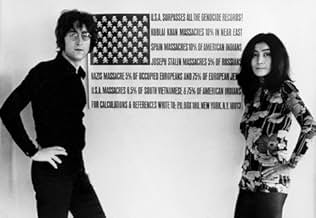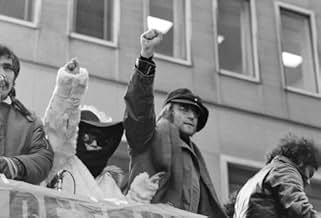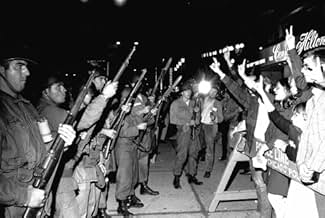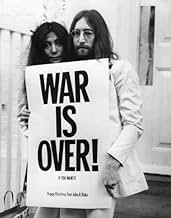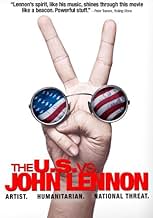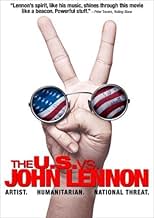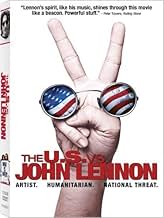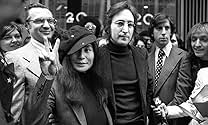AVALIAÇÃO DA IMDb
7,3/10
5,7 mil
SUA AVALIAÇÃO
Adicionar um enredo no seu idiomaA documentary on the life of John Lennon, with a focus on the time in his life when he transformed from a musician into an antiwar activist.A documentary on the life of John Lennon, with a focus on the time in his life when he transformed from a musician into an antiwar activist.A documentary on the life of John Lennon, with a focus on the time in his life when he transformed from a musician into an antiwar activist.
- Direção
- Roteiristas
- Artistas
- Prêmios
- 2 indicações no total
John Lennon
- Self
- (cenas de arquivo)
- Direção
- Roteiristas
- Elenco e equipe completos
- Produção, bilheteria e muito mais no IMDbPro
Avaliações em destaque
I am too young to really remember John Lennon being alive and what I know of him is mostly based around the Beatles and his later solo efforts which, in my view, saw him becoming a bit of a peacenik under the influence of Yoko Ono. As a result this film sat on my recorder for quite a few weeks before I got round to watching it but I am glad I did because it is actually a very interesting film that is pitched perfectly to inform viewers such as myself who perhaps did not know anything about John Lennon in the latter stages of his life.
It goes without saying that the film is sympathetic to Lennon and what he was trying to do and I suppose this is a fault within the telling that the bias towards him as a person is inherently there. This will put off some viewers who simply disagree with him, draw in those that agree but to the casual viewer I doubt it will come over as a problem and indeed for me it was just something I observed rather than something that was an issue. Anyway, what the film did well for me was to acknowledge that Lennon was an artist and a peacenik but to move him beyond the images and songs that we all know. This gives him as a person more of a foundation and meaning because, viewed in context of his time he actually comes over as a key figure and an intelligent man (albeit an artist!).
I'm sure some will see this as a problem because they disagree with it but the approach works. Setting the foundation and showing Lennon speaking out (in his own way) builds well to make the later persecution by Nixon's Whitehouse to be a natural progression and believable rather than being a rather sensationalist newspaper headline (or indeed like the title of the film itself). The use of archive footage is really well done as it makes rightly makes Lennon the main character while the contributions are mostly relevant and edited into the main flow well.
An interesting and engaging documentary that sits as a fitting tribute to who John Lennon was, even if it focuses on a specific period in his life. Understandably slanted to the left politically, it will appeal to the casual viewer quite easily.
It goes without saying that the film is sympathetic to Lennon and what he was trying to do and I suppose this is a fault within the telling that the bias towards him as a person is inherently there. This will put off some viewers who simply disagree with him, draw in those that agree but to the casual viewer I doubt it will come over as a problem and indeed for me it was just something I observed rather than something that was an issue. Anyway, what the film did well for me was to acknowledge that Lennon was an artist and a peacenik but to move him beyond the images and songs that we all know. This gives him as a person more of a foundation and meaning because, viewed in context of his time he actually comes over as a key figure and an intelligent man (albeit an artist!).
I'm sure some will see this as a problem because they disagree with it but the approach works. Setting the foundation and showing Lennon speaking out (in his own way) builds well to make the later persecution by Nixon's Whitehouse to be a natural progression and believable rather than being a rather sensationalist newspaper headline (or indeed like the title of the film itself). The use of archive footage is really well done as it makes rightly makes Lennon the main character while the contributions are mostly relevant and edited into the main flow well.
An interesting and engaging documentary that sits as a fitting tribute to who John Lennon was, even if it focuses on a specific period in his life. Understandably slanted to the left politically, it will appeal to the casual viewer quite easily.
"Imagine no possessions, I wonder if you can. No need for greed or hunger. A brotherhood of man. Imagine all the people, Sharing all the world. You may say I'm a dreamer. But I'm not the only one. I hope someday you'll join us. And the world will live as one." John Lennon, "Imagine" "All we are saying, Is give peace a chance." John Lennon, Give Peace a Chance I can't help hearing the song "Imagine" and feeling a little teary-eyed. I still remember being part of the worldwide vigil after John Lennon's murder and hearing the idealistic song, depicting a vision at that time suddenly sounding cruelly out-of-reach. The Beatles is one of those very few groups that seems to enjoy near-universal appreciation, from folks in their teens through those in retirement, including classical music aficionados as well as heavy metal enthusiasts. The songwriting power behind the group was primarily the genius of John Lennon and Paul McCartney, both of whom continued on to successful, creative solo careers.
With that background, how could I not jump at the opportunity to see a film about John Lennon? "The U.S. vs. John Lennon" is a documentary about the life of Lennon, specifically focusing on his peace activism during the Vietnam War era. I was certainly aware of his political engagement and songs such as "Give Peace a Chance", "Power to the People", and "Happy Christmas (War Is Over)". And I vaguely recall that there were some immigration issues that this English man faced in America. But I was not fully aware of, or perhaps forgot, how strongly the Nixon administration sought to deport John Lennon simply based on his views and activism.
The film moved at a very appropriate pace, introducing enough biography to help better understand the germane issues, quickly going through John's childhood, involvement with the Beatles, and marriage to his wife Yoko Ono. Consummate musician, John is quoted as saying that all that he really wanted to do was to make music. But the escalating violence in Vietnam made him an outspoken critic of the war. A master of publicity, he even turned what he knew would be dogged press during his honeymoon to his advantage by staging a well covered love-in for peace urging love and not war.
Richard Nixon held the office of President of the United States from 1969-1974 and is the only President to have resigned, facing impeachment for the "Watergate" scandal and clear abuse of power. In spite of election promises, Nixon plunged the country into deeper war with Vietnam amidst growing public outcry.
With the help of the heavy-handed J. Edgar Hoover, Director of the Federal Bureau of Investigation for almost fifty years (from 1924 until his death in 1972), the Nixon administration sought to silence some in the anti-war movement. It tried to deport John Lennon and, finding that he had a small charge of marijuana possession filed back in England earlier, used that as a pretext to demand his departure.
Eventually, Lennon's lawyer countersued and proved that the Nixon administration has conspired against him, with people from the very top of the government involved. Lennon won and was granted permanent immigration status to allow him to stay in New York, the city he loved. Unfortunately, in 1980, John Lennon was gunned down outside of his New York apartment by a deluded fan.
"The U.S. vs. John Lennon" is a moving film about a person larger than reality as if being a prolific and well-recognized songwriter weren't enough, he was a singer, guitarist, author, and political leader who embodied nonviolence and peace, influenced by Gandhi and he was very influential in each of these areas. Many would say that Lennon was one of the key spokespersons of the generation that came of age in the 1960s, and offered a vision of a world united by zest for living together and not divided by petty differences. It is also a film about how unchecked power can try to wield unfair influence in attacking its perceived enemies.
A vivid history lesson accompanied by many brilliant songs of John Lennon's, I highly recommend "The U.S. vs. John Lennon" to all (note that it is rated PG-13 for some "strong language, violent images and drug references" but I wonder if that is a little overstated). Viewers will (re)learn important biographical and historical aspects of the man and times, and, more importantly, see John Lennon's message for its universality and timelessness. The music alone will likely rekindle or begin new memories, and the documentary is a fascinating review of an important era in recent history.
8 stars out of 10
--Dilip Barman, Durham, NC
With that background, how could I not jump at the opportunity to see a film about John Lennon? "The U.S. vs. John Lennon" is a documentary about the life of Lennon, specifically focusing on his peace activism during the Vietnam War era. I was certainly aware of his political engagement and songs such as "Give Peace a Chance", "Power to the People", and "Happy Christmas (War Is Over)". And I vaguely recall that there were some immigration issues that this English man faced in America. But I was not fully aware of, or perhaps forgot, how strongly the Nixon administration sought to deport John Lennon simply based on his views and activism.
The film moved at a very appropriate pace, introducing enough biography to help better understand the germane issues, quickly going through John's childhood, involvement with the Beatles, and marriage to his wife Yoko Ono. Consummate musician, John is quoted as saying that all that he really wanted to do was to make music. But the escalating violence in Vietnam made him an outspoken critic of the war. A master of publicity, he even turned what he knew would be dogged press during his honeymoon to his advantage by staging a well covered love-in for peace urging love and not war.
Richard Nixon held the office of President of the United States from 1969-1974 and is the only President to have resigned, facing impeachment for the "Watergate" scandal and clear abuse of power. In spite of election promises, Nixon plunged the country into deeper war with Vietnam amidst growing public outcry.
With the help of the heavy-handed J. Edgar Hoover, Director of the Federal Bureau of Investigation for almost fifty years (from 1924 until his death in 1972), the Nixon administration sought to silence some in the anti-war movement. It tried to deport John Lennon and, finding that he had a small charge of marijuana possession filed back in England earlier, used that as a pretext to demand his departure.
Eventually, Lennon's lawyer countersued and proved that the Nixon administration has conspired against him, with people from the very top of the government involved. Lennon won and was granted permanent immigration status to allow him to stay in New York, the city he loved. Unfortunately, in 1980, John Lennon was gunned down outside of his New York apartment by a deluded fan.
"The U.S. vs. John Lennon" is a moving film about a person larger than reality as if being a prolific and well-recognized songwriter weren't enough, he was a singer, guitarist, author, and political leader who embodied nonviolence and peace, influenced by Gandhi and he was very influential in each of these areas. Many would say that Lennon was one of the key spokespersons of the generation that came of age in the 1960s, and offered a vision of a world united by zest for living together and not divided by petty differences. It is also a film about how unchecked power can try to wield unfair influence in attacking its perceived enemies.
A vivid history lesson accompanied by many brilliant songs of John Lennon's, I highly recommend "The U.S. vs. John Lennon" to all (note that it is rated PG-13 for some "strong language, violent images and drug references" but I wonder if that is a little overstated). Viewers will (re)learn important biographical and historical aspects of the man and times, and, more importantly, see John Lennon's message for its universality and timelessness. The music alone will likely rekindle or begin new memories, and the documentary is a fascinating review of an important era in recent history.
8 stars out of 10
--Dilip Barman, Durham, NC
I was in high school in 1980 when John Lennon was assassinated and all I really knew about him was that he was a musician and a member of the Beatles. I found this documentary fascinating, which gave an excellent insight into Lennon's participation in and effect on the anti-war movement in the US during the Vietnam War. I came away with a greater respect of the man and what he tried to do along with with his wife and the pressures they faced from the US government who wanted to silence them. Although some parts were something of a rehash about the anti-war movement in general, the skillful editing along with use of numerous interviews and recorded material still made it enjoyable and informative. One can not help but draw a comparison between this film and message and the on-going debate over the Iraq war, which I suspect was one of the goals of those who made it. I saw this film at a suburban Washington DC theater this weekend, and when one of the interviewees said "John Lennon represented light, and Mr. Nixon and Mr. Bush represented death" at least half the audience clapped. I guess it made its point to this audience. If you get a chance to see it, I highly recommend it.
For those of us who followed Lennon and the Beatles through those tumultuous years, this was a simple summary that really didn't break any ground or uncover any new information. The filmmakers were more excited to find a few pieces of lost or mislabeled footage, such as Lennon being given his green card, than to enlighten those of us who were along for the ride all along. But it was good to hear from John again, even to say "flower power didn't work, so what? You do something else." No coverage was given John's activism or lack thereof during his infamous "lost weekend." Yoko's constant presence saw to that.
But I would love for my son and his generation to see it. Much of what is going on today has gone unchallenged, and the return of the J. Edgar Hooverization of America has been obvious to those of us who were awake back then.
But I would love for my son and his generation to see it. Much of what is going on today has gone unchallenged, and the return of the J. Edgar Hooverization of America has been obvious to those of us who were awake back then.
Those who do not learn from history are doomed to repeat it. If "The U.S. vs. John Lennon" is anything, it's an examination of the similarities between the Nixon Administration and the national debacle that was the Vietnam War, compared to the current Bush Administration and the national debacle that is the Iraq War. The difference, of course, is that Nixon had John and Yoko Lennon to contend with. Who do we have to lead our protests and write our anthems? Michael Moore? Not good enough.
When Lennon moved to New York City in 1970, the Nixon Administration was terrified that he had the power to organize the anti-war protesters and affect the outcome of elections (particularly Nixon's 1972 run for re-election). Lennon was wiretapped and followed by the FBI (which was being used at that time to "quell decent"). The Immigration and Naturalization Service tried for five years to deport him, but he got a lawyer and fought back, and in 1976, on his birthday, on his son Sean's birthday, he learned that he and Yoko had won their case, and they could stay.
"The U.S. vs. John Lennon" makes you want to take a stand, organize a protest, demand peace, and stick it to the man!
When Lennon moved to New York City in 1970, the Nixon Administration was terrified that he had the power to organize the anti-war protesters and affect the outcome of elections (particularly Nixon's 1972 run for re-election). Lennon was wiretapped and followed by the FBI (which was being used at that time to "quell decent"). The Immigration and Naturalization Service tried for five years to deport him, but he got a lawyer and fought back, and in 1976, on his birthday, on his son Sean's birthday, he learned that he and Yoko had won their case, and they could stay.
"The U.S. vs. John Lennon" makes you want to take a stand, organize a protest, demand peace, and stick it to the man!
Você sabia?
- Citações
Gore Vidal: Patriotism is the last refuge of the scoundrel.
- Trilhas sonorasJohn Sinclair
Written by John Lennon
Performed by John Lennon
Courtesy of Capitol Records
Under license from EMI Film & Television Music
Principais escolhas
Faça login para avaliar e ver a lista de recomendações personalizadas
- How long is The U.S. vs. John Lennon?Fornecido pela Alexa
Detalhes
Bilheteria
- Faturamento bruto nos EUA e Canadá
- US$ 1.109.146
- Fim de semana de estreia nos EUA e Canadá
- US$ 69.143
- 17 de set. de 2006
- Faturamento bruto mundial
- US$ 1.408.065
- Tempo de duração
- 1 h 39 min(99 min)
- Cor
- Proporção
- 1.78 : 1
Contribua para esta página
Sugerir uma alteração ou adicionar conteúdo ausente


